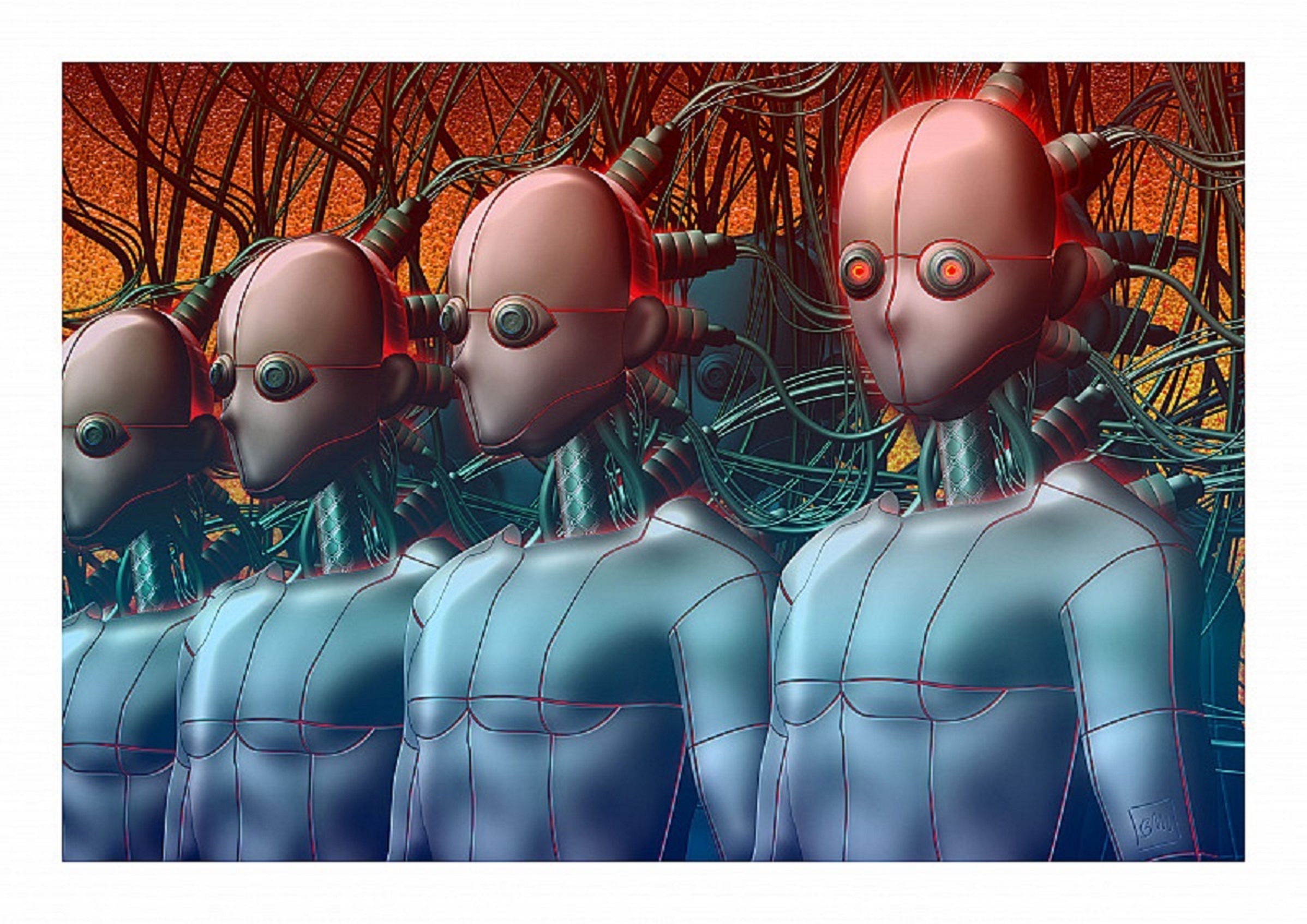Coming out of our heads and back properly ‘into ourselves’ (i.e. back into the ‘Wholeness of Ourselves’) is without any doubt the single most practically ‘useful’ thing we could ever learn. Unfortunately, it is also something that we are very unlikely to learn under normal circumstances because our culture does not value, or even properly acknowledge, the state of ‘not being in our heads’. We don’t tend to have any comprehension about what this means.
We learn a lot of stuff – practically from the word ‘GO’, but it’s all head stuff, its all to do with being in our heads. This is what all of our so-called ‘education’ comes down to – we get to learn to do more and more stuff in our heads whilst any other side to us – anything that isn’t to do with the Central Processing Unit of the rational mind in other words – is almost entirely ignored.
So what’s wrong with this, we might ask? Our rational faculty is our strong point, it is our ‘evolutionary asset’, so why on earth shouldn’t we capitalize on it? Why wouldn’t we build upon our asset and try to maximize its benefit?
The answer to this question is very straightforward and easy to understand – just because something is good doesn’t mean that ten times that something is going to be ten times as good! To drink water is beneficial but drink too much of it and you will over-dilute your potassium ions and die from heart failure as a result, and there is – needless to say – nothing particularly ‘beneficial’ about this. To cook meat is good because it makes it tender and easier to eat but if you double or triple the heat of the oven for ‘extra-beneficial effect’ then instead of something you can eat you end up with a blackened, charred cinder!
Similarly, to be able to think about things is good but if you think ten times as much, a hundred times as much, a thousand times as much that doesn’t mean that it will be ten times, a hundred times, a thousand times as good! Quite the reverse is true – too much thinking has an entirely detrimental effect. It has what can only be described as a disastrous effect – too much thinking, too much analysis, too much rationalization, is downright ruinous to our mental health.
Too much thinking severely detracts from our quality of life – after all, thinking about life is not the same as living it and when you are thinking about doing something this effectively distracts us from being able to actually do it. Thinking about life detracts from the experience of actually being alive. If I am drinking a glass of orange juice and I am thinking about drinking it (if I am analyzing the flavour and making a plan in my head to buy myself another when I finish it, or trying to remember all the other times that I might have drunk orange juice and whether I enjoyed it as much) then all this mental activity takes away from the experience. My thinking takes centre-stage, rather than the actual reality of what is going on – which is the wrong order of things. As we have said, not only is thinking about doing something not the same as doing it, it also detracts from the experience of doing it. It is a block, an obstacle in the way of the experience.
Thinking – we might say – is a ‘measuring’ kind of a thing, a ‘quantitative’ kind of a thing. Life on the other hand is a qualitative kind of affair. That’s why we talk about ‘quality of life’ rather than ‘quantity of life’. Quantity doesn’t make up for quality!
Not only does quantity not make up for quality, if we are involved in some sort of quantitative analysis of life (i.e. if we are thinking about things) then this effectively blocks us from having a qualitative appreciation of it. To much planning and evaluation ruins the event. The thought blocks the reality, the menu (if we don’t let go of it or put it down) blocks the meal…
What is more, too much thinking, too many ideas and concepts, doesn’t just detract from our quality of life, it produces actual mental suffering. It produces mental suffering because it starves us of actual reality. It produces mental suffering because it constricts us, because it ties us up in knots, because it strangulates us – cutting of our air supply. Too much thinking becomes like a weed that chokes the actual crop and we end up with a whole rake of facts and figures, thoughts and ideas, concepts and words, but no actual qualitative content.
Too much thinking (too much time spent in our heads) takes us out of reality. It isolates us, alienates us, disconnects us. Too much thinking turns us into our own isolated, alienated, disconnected mental objects.
Although we are told that neurotic mental ‘illness’ such as anxiety, phobias, OCD, and depression have a chemical basis (which is to say, that they have a straightforward bio-mechanical causation) this is really little more than a reflection of our cultural bias towards looking at everything in a purely intellectual way. If neurotic conditions such as anxiety and depression are due to chemical-biological causation then this carries the implication that we can ‘fix’ them if we’re clever enough, if we learn the technique of being able to manipulate the various mechanical parameters of the problem. This implication is of course one that we are all too comfortable with.
By the same token the suggestion that neurotic distress is caused by ‘too much thinking’ (or by ‘being in our heads too much’) isn’t acceptable because it doesn’t offer us any way of manipulating or controlling the situation. Quite the contrary is true – this way of understanding neurotic suffering means that any sort of intellectual approach to matters is only going to make things worse, since our response to the problem is simply to add more of the very ingredient that was making us sick in the first place!
Thinking isn’t the cure for what we call neurotic mental illness, it is the cause! Thinking harder (or more cleverly) isn’t going to help us – not thinking is what is going to help us. The matter of ‘how to free ourselves from having to compulsively think about things the whole time’ is however most definitely not a rational-intellectual problem (or to put it another way, we can’t treat this as just another problem that can be remedied by staying within the safe-and-secure confines of our heads).
What does help us in the case of neurotic distress is learning to come out of our heads – which as we have said is something of a radically new idea in the rational-technological world that we live. It is in fact tantamount to heresy. We might be suspected – God forbid – of being irrational.
What is far more attractive to us than the idea of relinquishing the strangulating control that we have over our own minds and handing everything back over to nature, so to speak, (or back to the spontaneous mind) is inventing some kind of therapy that gives the control back to us. This is what we want above all else – although to be strictly accurate it is not ‘us’ that wants it but the disconnected rational intellect (the ‘central processing unit’) which we automatically identify with. It is for this reason that we are so prone to putting all our trust either in neurotransmitter-manipulating pharmaceutical therapy or impressive-sounding ‘head-based’ therapies with names made out of fancy acronyms. The fact that we fondly imagine that a therapy which is designated by a string of letters (and which is therefore quintessentially a product of the abstract, symbol-loving conceptual mind) can ever free us from the labyrinthine complexities and contradictions of runaway rationality) is clear evidence of the bizarre type of insanity that we are collectively afflicted with! Can rationality free us from rationality? As Prem Rawat says
People who are caught up in explanations… are on one hand pulling thorns out of their foot, and on the other hand they are sowing them…
‘Head-based’ therapies aren’t going to help us – no matter how high-powered they sound. In fact the more high-powered they sound, the more toxic they are bound to prove since our infatuation with them means that we are going to be that much less likely to see through them. Rational therapies are all just mere ‘cleverness’ – they are all just exercises in trickiness, exercises in jiggery-pokery, they are all just ‘ducking-and-diving’. How can I strategize my way out of the mess that I’m in, given that it was strategizing that got me into the mess? How can I find peace of mind by being cleverer at controlling myself when ‘control’ equals conflict and conflict is – by anyone’s reckoning – the very antithesis of ‘peace of mind’? How can I think my way back to mental health, given that it was the alienation and dissociation caused by too much thinking that caused me to lose it in the first place?
No one ever strategized their way to happiness, not in the entire history of the human race! Not even once did this ever happen. No one ever obtained a good quality of life as a result of being clever; no one ever became ‘mentally healthy’ as a result of learning new and sophisticated ways of thinking, new and sophisticated techniques and protocols for problem-solving. No one ever did, and no one ever will since all this ‘control-type’ stuff is the very antithesis of genuine, honest spontaneity.
No one ever worked out what life was all about by thinking about it, strange though this assertion may seem to anyone brought up in our overly-rationalistic and manipulative culture. No one ever found out the right way to ‘be’ in the world by using the instrument of the rational mind. The instrument of the rational mind is good for solving logical puzzles, but existence (or ‘life’) isn’t a logical puzzle. Life (or ‘existence’) is ‘a given’ – perfect in itself simply because it is beyond our ability either to understand or manipulate it.
Life isn’t a problem to be solved or an object to be analyzed. If it were then this would mean that we would have to be somehow outside of life, removed from it, at a ‘safe distance’ from it. If life or existence was a problem to be solved or an object to be analyzed then this would mean that we (the solver, the analyzer) must be something else apart from life, apart from what we are trying to solve or analyze. But if this were the case then we would necessarily be hopelessly alienated from life, isolated from life, disconnected from life.
And the state of being alienated from life, isolated from life, disconnected from life is neurotic suffering. Neurotic suffering is the inevitable result of being ‘trapped in our heads’ and the only way we are ever going to be free from it is if we learn the very practical art of coming out of our heads, back into the ‘Wholeness of Ourselves’ that we have turned our backs on so long ago…
Image: wallpaperflare.com






